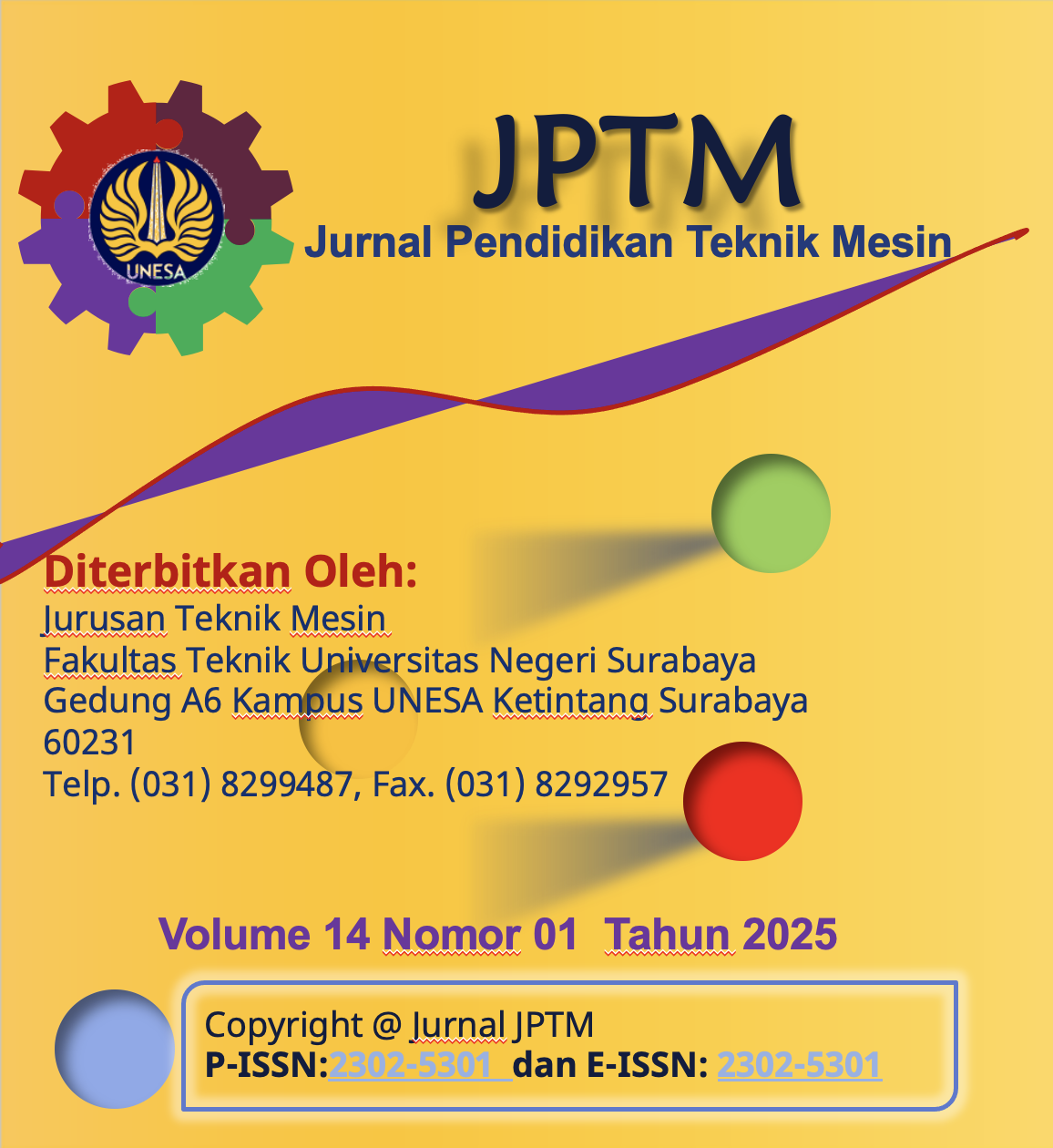PENGARUH MODEL PEMBELAJARAN PROBLEM BASED LEARNING TERHADAP KEMAMPUAN BERPIKIR KRITIS, MOTIVASI BELAJAR DAN HASIL BELAJAR SISWA PADA MATA PELAJARAN PEMELIHARAAN MESIN KENDARAAN RINGAN KELAS XI JURUSAN TEKNIK KENDARAAN RINGAN OTOMOTIF DI SMK N 3 SURABAYA
Keywords:
Problem Based Learning (PBL), berpikir kritis, motivasi belajar, hasil belajarAbstract
Abstract
This study aims to evaluate the effect of the Problem Based Learning (PBL) model on critical thinking skills, learning motivation, and learning outcomes of eleventh-grade students in the Light Vehicle Engineering program at SMK N 3 Surabaya. The method used is a quasi-experimental design with experimental and control classes. Data were collected through questionnaires and tests and then analyzed using the Independent Sample Test. The results indicate that PBL significantly enhances students' critical thinking skills, with the experimental group showing higher average scores compared to the control group. The PBL model also positively affects learning motivation, as the experimental group achieved better scores than the control group. Additionally, students' learning outcomes improved significantly, with the experimental group attaining higher scores than the control group. Analysis of student responses reveals a positive attitude toward PBL, reflecting satisfaction and appreciation for the collaboration it offers. In conclusion, PBL is effective in enhancing students' critical thinking skills, motivation, and learning outcomes. It is recommended that the PBL model be more widely integrated into the SMK curriculum, focusing on industry-relevant topics to prepare students for future challenges. Training for teachers and ongoing evaluation of research instruments are also highly recommended to improve the quality of education.
Keywords: Problem Based Learning (PBL), Critical Thinking, Learning Motivation ,Learning Outcomes.
Downloads
References
1. Abidin, Z., Karyono, H., & Rahayu, E. M. (2021). Pengaruh Model Project Based Learning Dan Motivasi Belajar Terhadap Hasil Belajar Pada Mata Pelajaran Produktif Di Smk. Jipi (Jurnal Ilmiah Penelitian Dan Pembelajaran Informatika), 6(1), 58–64. Https://Doi.Org/10.29100/Jipi.V6i1.1619
2. Andi Kamal, 2024. (2024). Kurikulum Merdeka Dalam Studi Kasus Pbl : 3(1), 15–28.
3. Ardianti, R., Sujarwanto, E., & Surahman, E. (2022). Problem-Based Learning: Apa Dan Bagaimana. Diffraction, 3(1), 27–35. Https://Doi.Org/10.37058/Diffraction.V3i1.4416
4. Arini, W., & Lovisia, E. (2019). Respon Siswa Terhadap Media Pembelajaran Alat Pirolisis Sampah Plastik Berbasis Lingkungan Di Smp Kabupaten Musi Rawas. Thabiea : Journal Of Natural Science Teaching, 2(2), 95–104. Https://Doi.Org/10.21043/Thabiea.V2i2.5950
5. Asrulla, Risnita, Jailani, M. S., & Jeka, F. (2023). Populasi Dan Sampling (Kuantitatif), Serta Pemilihan Informan Kunci (Kualitatif) Dalam Pendekatan Praktis. Jurnal Pendidikan Tambusai, 7(3), 26320–26332.
6. Aulia Rahmat, Andrizal, I. Y. B. (2023). Pengaruh Metode Pembelajaran Problem Based Learning Terhadap Hasil Belajar Mata Pelajaran Teknologi Dasar Otomotif Siswa Smk Negeri 1 Padang. Borobudur Educational Review, 3(1), 1–10. Http://Siasat.Fkip-Umt.Ac.Id/Siasat-Fkipumt.Net/Assets/Pdf/Pengaruh_Model_Pembelajaran_Cooperative_Script_Pada_Pembelajaran_Menceritakan_Kembali_Teks_Ulasan_Tentang_Kualitas_Karya_Cerpen_Pada_Siswa_Kelas_Viii_Mts_Daarul_Hikmah_Cipondoh.Pdf
7. Dewanto, & Santosa, T. A. (2024). Pengaruh Model Discovery Learning Berbasis Iot Terhadap Kemampuan Berpikir Kritis Siswa: Meta -Analysis. Puan Indonesia, 5(2), 615–626. Https://Doi.Org/10.37296/Jpi.V5i2.223
8. Dwi Nugraheni Rositawati, 2018. (2018). Kajian Berpikir Kritis Pada Metode Inkuiriheni. 74–84.
9. Hermansyah. (2020). Problem Based Learning In Indonesian Learning. 3(3), 2257–2262.
10. Indardi, M. D. (2023). Meningkatkan Motivasi Belajar Mahasiswa Terhadap Metode Pembelajaran Online Melalui Penghargaan Dan Hukuman. 493–499.
11. Meilasari, S., Damris M, D. M., & Yelianti, U. (2020). Kajian Model Pembelajaran Problem Based Learning (Pbl) Dalam Pembelajaran Di Sekolah. Bioedusains:Jurnal Pendidikan Biologi Dan Sains, 3(2), 195–207. Https://Doi.Org/10.31539/Bioedusains.V3i2.1849
12. Melina, N. (2020). Pengaruh Model Problem Based Learning ( Pbl ) Terhadap Hasil Belajar Fbb Dan Kpk Di Kelas Iv Sdn Gugus 5. 4, 2502–2507.
13. Rohmah, A. N., & Dasar, P. (2017). Belajar Dan Pembelajaran. 09(02), 193–210.
14. Rustamana, A., Wahyuningsih, P., Azka, M. F., & Wahyu, P. (2024). Penelitian Metode Kuantitatif. Sindoro Cendikia Pendidikan, 5(6), 1–10.
15. Sajadi, D. (2022). Komponen Proses Pembelajaran Melalui Belajar Mengajar . Pembelajaran Merujuk Kepada Interaksi Aktif Peserta Didik Dan Relevan Dengan Konsep Belajar Yang Menghendaki Students Centre . Pendidik. Jurnal Pendidikan Islam, 5(2), 36–48.
16. Selvi Meilasari, 2020. (2020). Kajian Model Pembelajaran Problem Based Learning (Pbl) Dalam Pembelajaran Di Sekolah. 3(3), 195–207.
17. Sugiyono, P. D. (2022). Metode Penelitian.
18. Suryanti. (2021). Penerapan Model Pembelajaran Project Based Learning (Pjbl) Terintegrasi Stem (Science, Technology, Engineering And Math) Untuk Meningkatkan Kreativitas Siswa Kelas Xi Mia Di Sma N 10 Kota Jambi. In Industry And Higher Education (Vol. 3, Issue 1).
19. Utomo, W. (2021). Paradigma Pendidikan Vokasi: Tantangan, Harapan Dan Kenyataan. Almufi Journal Of Measurement, Assessment, And Evaluation Education, 1(2), 65–72.
20. Yuliana, Y. (2019). Inovasi Pembelajaran Melalui Teknologi Informasi: Pengembangan Model Pembelajaran Melalui Internet. Jurnal Isema : Islamic Educational Management, 4(1), 119–132. Https://Doi.Org/10.15575/Isema.V4i1.5179
Downloads
Published
Issue
Section
 Abstract views: 161
,
Abstract views: 161
, PDF Downloads: 113
PDF Downloads: 113





